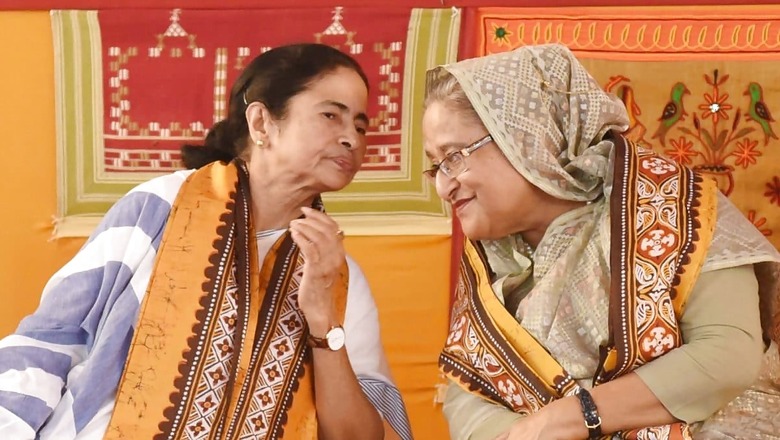
views
Post her remarks on student led quota-protests in Dhaka, Hasina’s office — then in power — registered its displeasure with the government of India. However, Banerjee deftly protected her political turf and support base. As Bangladesh’s situation worsened, her statements seemed to be a prophecy.
Several sources in the central and state security agencies stated that Banerjee, with her astute political acumen and extensive network, anticipated a huge political turmoil in the neighbouring country and its likely impact on the state and was monitoring the situation closely.
Starting with events like the enclave exchange, contentious Teesta water-sharing agreement, the instance of one of the assassins of Bangabandhu Sheikh Mujibur Rahman assuming a new identity while hiding in the state for 20 years, and finally the alleged ‘planned’ murder of Bangladesh’s Awami League MP in Rajarhat (northern fringe of Kolkata), West Bengal has consistently borne the brunt of political instability in the region, compounded by the complex dynamics of India-Bangladesh bilateral relations.
With the fall of Hasina’s regime and her party Awami League, West Bengal, its borders and several districts are back in a state of flux.
Didi’s dynamics
Despite significant Bengali and Bangladeshi business and political interests intertwined, and Muslims being a crucial political demographic in West Bengal, Banerjee has maintained a firm grasp on cross-border dynamics.
She is recognised as one of the shrewdest and wisest politicians in this regard and knows how to protect her turf without antagonising her crucial support base.
Multiple sources in central and state security agencies told News18 that the West Bengal chief minister was well-informed and closely monitored the political developments in Bangladesh. Her recent remarks on the student protests, refugees, and the political turmoil reflect her thorough groundwork and awareness.
As the events unfolded in Bangladesh on August 5, starting with Sheikh Hasina resigning and leaving her official residence, the chief minister’s office in Bengal appeared prepared. The state’s police establishment and security agencies were well briefed, indicating Banerjee’s grasp on the interplay between regional politics and the state’s security.
Wired Relations
Since its formation in 1971, Bangladesh has experienced numerous violent regime changes, with the army and caretaker governments often stepping in during periods of political turmoil. The neighbouring country has always been a point of contention and concern for India, with all developments — political, economic and social — having significant implications on West Bengal. The state bears most of the political and economic ramifications, primarily due to the shared past of partition, legacy and parentage.
Throughout these turbulent times, Hasina has maintained not only a friendly relationship with the government of India but also cordial and almost familial ties with West Bengal’s chief ministers. This includes Left Front leaders Jyoti Basu and Buddhadeb Bhattacharjee, as well as the current chief minister. Hasina led a 30-member delegation to Kolkata in 2010 after Basu died and paid tributes to him in the state’s assembly. She also called Banerjee her ‘younger sister’ and maintained a personal bond with her.
Banerjee always reciprocated the warmth, barring the time when she was asked to give her consent for the Teesta water-sharing treaty. The impasse over the treaty fuels resentment in Bangladesh, where there is a perception that India — particularly West Bengal — is not acting fairly. This adds to the complexity of bilateral relations and influences internal politics in Bangladesh, with political parties using it as a rallying point against perceived Indian dominance.
The murder of a Bangladeshi MP in Rajarhat also highlighted the intricate and sometimes fraught connections between the two regions. Such incidents can strain diplomatic relations and raise security issues, affecting cross-border cooperation and trust.
Fading Camaraderie
With multiple geo-political and regional issues, this long-standing camaraderie seems to be now fraying. For the first time, Banerjee was excluded from a crucial meeting between India and Bangladesh on the Teesta water-sharing issue.
Expressing her displeasure, Banerjee registered her protest. Recently, she made a statement in response to the violent peak of the student movement in Dhaka, which led to an unprecedented diplomatic row. The Bangladeshi government lodged a formal protest with the Indian High Commission in Dhaka, marking a significant departure from the previously warm relations.
In fact, Hasina’s security detail chose to land in Agartala and Delhi, but not in Kolkata, which has the closest ties with her.
West Bengal’s geopolitical significance means that any unrest or political change in Bangladesh reverberates in the state, affecting everything from security policies to economic agreements. The intertwined nature of their histories, economies, and cultures makes West Bengal a critical stakeholder in Bangladesh’s political landscape where developments can have immediate and profound effects on its own stability and progress. Banerjee is also aware of the politics of it and is careful about the demographic dividend.




















Comments
0 comment